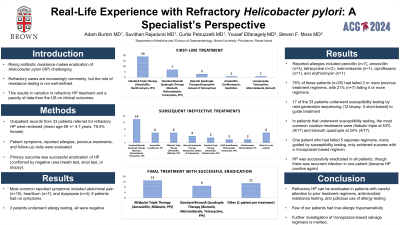Sunday Poster Session
Category: Stomach
P1598 - Real-Life Experience With Refractory Helicobacter Pylori: A Specialist’s Perspective
Sunday, October 27, 2024
3:30 PM - 7:00 PM ET
Location: Exhibit Hall E

Has Audio
.jpeg.jpg)
Adam M. Burton, MD
Brown Medicine/Lifespan
Providence, RI
Presenting Author(s)
Award: Presidential Poster Award
Adam M. Burton, MD1, Suvithan Rajadurai, MD2, Curtis Petruzzelli, MD2, Yousef Elfanagely, MD3, Steven Moss, MD1
1Brown Medicine/Lifespan, Providence, RI; 2Brown University / Rhode Island Hospital, Providence, RI; 3Brown University, Providence, RI
Introduction: Rising antibiotic resistance makes eradication of Helicobacter pylori (HP) challenging. Refractory cases are increasingly commonly, but the role of resistance testing is not well-defined. This results in variation in refractory HP treatment and a paucity of data from the US on clinical outcomes. We reviewed the management of refractory HP in an office practice specialized in refractory HP management.
Methods: We reviewed outpatient records from patients referred for refractory HP. Patient symptoms, reported allergies, previous treatments, and follow-up visits were evaluated. The primary outcome was successful eradication of HP (confirmed by negative urea breath test, stool test, or biopsy).
Results: Thirty three patients (mean age 59 +/- 4.7 years, 79.4% female) were included. Most common reported symptoms included abdominal pain (n=10), heartburn (n=7), and dyspepsia (n=4); 6 patients had no symptoms. Reported allergies included penicillin (n=7), amoxicillin (n=3), tetracycline (n=2), metronidazole (n=1), ciprofloxacin (n=1), and erythromycin (n=1). 76% of these patients had failed 2 or more previous treatment regimens, with 21% failing 4 or more regimens. Three patients underwent formal penicillin allergy testing, all were negative. Seventeen of the 33 patients underwent susceptibility testing by next-generation sequencing (12 biopsy, 5 stool-based) to guide treatment. Following treatment, 32 cases of HP (97%) were successfully eradicated. Overall, the most common successful treatment regimens used were Rifabutin triple and Bismuth based quadruple at 42% (14/33) and 36% (12/33) respectively. In patients that underwent susceptibility testing, the most common curative treatments were also rifabutin triple at 53% (9/17) and bismuth quadruple at 24% (4/17). Interestingly, one patient was who had failed 5 separate regimens, many guided by susceptibility testing, only achieved success with a vonoprazan based regimen.
Discussion: Refractory HP can be successfully eradicated in patients with careful attention to prior treatment regimens, antimicrobial resistance testing, and the judicious use of allergy testing. Although many of our patients with refractory infection endorsed allergies to commonly prescribed antibiotics for HP, few had true hypersensitivity. Rifabutin regimens were the most frequently used successful salvage treatments. Further investigation of vonaprazan-based salvage regimens is merited.
Note: The table for this abstract can be viewed in the ePoster Gallery section of the ACG 2024 ePoster Site or in The American Journal of Gastroenterology's abstract supplement issue, both of which will be available starting October 27, 2024.
Disclosures:
Adam M. Burton, MD1, Suvithan Rajadurai, MD2, Curtis Petruzzelli, MD2, Yousef Elfanagely, MD3, Steven Moss, MD1. P1598 - Real-Life Experience With Refractory <i>Helicobacter Pylori</i>: A Specialist’s Perspective, ACG 2024 Annual Scientific Meeting Abstracts. Philadelphia, PA: American College of Gastroenterology.
Adam M. Burton, MD1, Suvithan Rajadurai, MD2, Curtis Petruzzelli, MD2, Yousef Elfanagely, MD3, Steven Moss, MD1
1Brown Medicine/Lifespan, Providence, RI; 2Brown University / Rhode Island Hospital, Providence, RI; 3Brown University, Providence, RI
Introduction: Rising antibiotic resistance makes eradication of Helicobacter pylori (HP) challenging. Refractory cases are increasingly commonly, but the role of resistance testing is not well-defined. This results in variation in refractory HP treatment and a paucity of data from the US on clinical outcomes. We reviewed the management of refractory HP in an office practice specialized in refractory HP management.
Methods: We reviewed outpatient records from patients referred for refractory HP. Patient symptoms, reported allergies, previous treatments, and follow-up visits were evaluated. The primary outcome was successful eradication of HP (confirmed by negative urea breath test, stool test, or biopsy).
Results: Thirty three patients (mean age 59 +/- 4.7 years, 79.4% female) were included. Most common reported symptoms included abdominal pain (n=10), heartburn (n=7), and dyspepsia (n=4); 6 patients had no symptoms. Reported allergies included penicillin (n=7), amoxicillin (n=3), tetracycline (n=2), metronidazole (n=1), ciprofloxacin (n=1), and erythromycin (n=1). 76% of these patients had failed 2 or more previous treatment regimens, with 21% failing 4 or more regimens. Three patients underwent formal penicillin allergy testing, all were negative. Seventeen of the 33 patients underwent susceptibility testing by next-generation sequencing (12 biopsy, 5 stool-based) to guide treatment. Following treatment, 32 cases of HP (97%) were successfully eradicated. Overall, the most common successful treatment regimens used were Rifabutin triple and Bismuth based quadruple at 42% (14/33) and 36% (12/33) respectively. In patients that underwent susceptibility testing, the most common curative treatments were also rifabutin triple at 53% (9/17) and bismuth quadruple at 24% (4/17). Interestingly, one patient was who had failed 5 separate regimens, many guided by susceptibility testing, only achieved success with a vonoprazan based regimen.
Discussion: Refractory HP can be successfully eradicated in patients with careful attention to prior treatment regimens, antimicrobial resistance testing, and the judicious use of allergy testing. Although many of our patients with refractory infection endorsed allergies to commonly prescribed antibiotics for HP, few had true hypersensitivity. Rifabutin regimens were the most frequently used successful salvage treatments. Further investigation of vonaprazan-based salvage regimens is merited.
Note: The table for this abstract can be viewed in the ePoster Gallery section of the ACG 2024 ePoster Site or in The American Journal of Gastroenterology's abstract supplement issue, both of which will be available starting October 27, 2024.
Disclosures:
Adam Burton indicated no relevant financial relationships.
Suvithan Rajadurai indicated no relevant financial relationships.
Curtis Petruzzelli indicated no relevant financial relationships.
Yousef Elfanagely indicated no relevant financial relationships.
Steven Moss indicated no relevant financial relationships.
Adam M. Burton, MD1, Suvithan Rajadurai, MD2, Curtis Petruzzelli, MD2, Yousef Elfanagely, MD3, Steven Moss, MD1. P1598 - Real-Life Experience With Refractory <i>Helicobacter Pylori</i>: A Specialist’s Perspective, ACG 2024 Annual Scientific Meeting Abstracts. Philadelphia, PA: American College of Gastroenterology.

